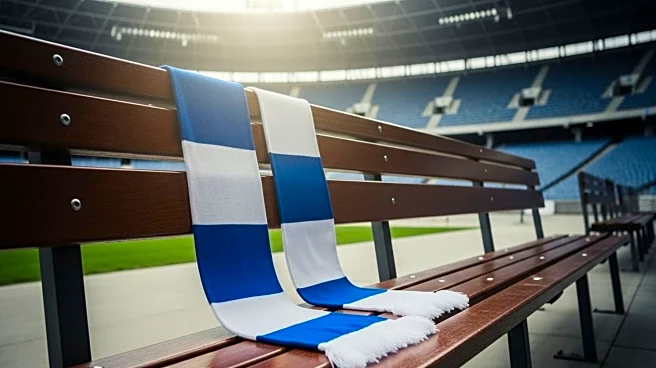What's Happening?
Jose Mourinho, the former Chelsea manager, returned to Stamford Bridge as the head coach of Benfica for a Champions League match against Chelsea. Despite his team's 1-0 loss, Mourinho was warmly received by Chelsea fans, who chanted his name. In response, Mourinho waved and blew a kiss to the crowd, acknowledging their support. During the match, he also intervened to stop Benfica fans from throwing objects at Chelsea's Enzo Fernandez. Mourinho's return to Stamford Bridge was marked by nostalgia, as he expressed his enduring connection to the club and its supporters.
Why It's Important?
Mourinho's return to Stamford Bridge highlights the lasting impact he has had on Chelsea and its fans. His gestures of appreciation towards the Chelsea supporters underscore the mutual respect and admiration that exists despite his current role with Benfica. This event also reflects the broader dynamics of football, where past affiliations and achievements continue to influence present relationships and fan interactions. Mourinho's actions during the match, including his intervention with Benfica fans, demonstrate his commitment to sportsmanship and maintaining a respectful atmosphere.
What's Next?
Mourinho's career continues to evolve as he leads Benfica in the Champions League. His future interactions with Chelsea and its fans may further solidify his legacy at the club. The reception he received at Stamford Bridge could influence his approach in future matches, potentially fostering a more collaborative relationship between the clubs. Additionally, Mourinho's focus on winning and his competitive nature suggest that he will continue to strive for success with Benfica, aiming to enhance his reputation in European football.
Beyond the Headlines
Mourinho's return to Stamford Bridge serves as a reminder of the emotional connections and historical ties that exist in sports. His acknowledgment of Chelsea fans and his comments about their lasting relationship highlight the cultural and personal dimensions of football. This event also raises questions about the role of former managers in shaping club identities and the impact of their legacies on current team dynamics.








